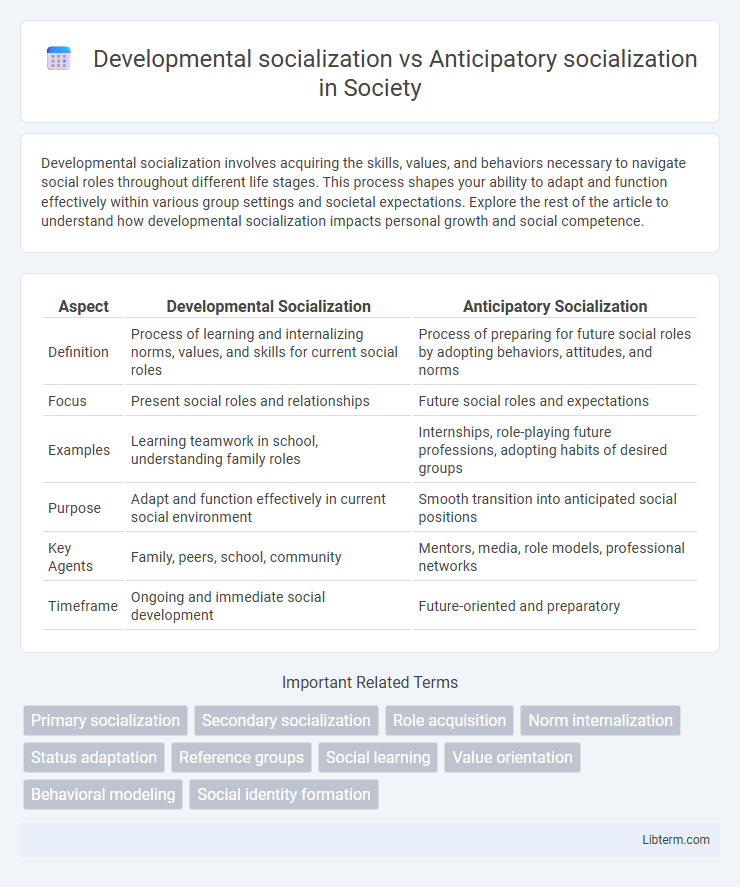Developmental socialization involves acquiring the skills, values, and behaviors necessary to navigate social roles throughout different life stages. This process shapes your ability to adapt and function effectively within various group settings and societal expectations. Explore the rest of the article to understand how developmental socialization impacts personal growth and social competence.
Table of Comparison
| Aspect | Developmental Socialization | Anticipatory Socialization |
|---|---|---|
| Definition | Process of learning and internalizing norms, values, and skills for current social roles | Process of preparing for future social roles by adopting behaviors, attitudes, and norms |
| Focus | Present social roles and relationships | Future social roles and expectations |
| Examples | Learning teamwork in school, understanding family roles | Internships, role-playing future professions, adopting habits of desired groups |
| Purpose | Adapt and function effectively in current social environment | Smooth transition into anticipated social positions |
| Key Agents | Family, peers, school, community | Mentors, media, role models, professional networks |
| Timeframe | Ongoing and immediate social development | Future-oriented and preparatory |
Introduction to Socialization Processes
Developmental socialization involves acquiring skills and behaviors needed for current social roles, emphasizing gradual adaptation within existing social contexts. Anticipatory socialization prepares individuals for future roles by adopting norms, values, and behaviors of groups they aspire to join. Both processes are fundamental in shaping identity and facilitating smooth transitions through different social stages.
Defining Developmental Socialization
Developmental socialization is the process through which individuals acquire new skills, knowledge, and behaviors necessary for adapting to changing roles within existing social structures. It emphasizes ongoing learning and adjustment in response to evolving social expectations over time. Unlike anticipatory socialization, which involves preparing for future roles, developmental socialization focuses on growth and adaptation within current social contexts.
Understanding Anticipatory Socialization
Anticipatory socialization involves adopting behaviors, values, and norms of a group one aspires to join, enabling smoother integration and adjustment. This process is crucial in preparing individuals for future roles, such as students entering the workforce or employees moving into managerial positions. Understanding anticipatory socialization highlights its role in shaping identity and expectations before actual group membership occurs.
Key Differences Between Developmental and Anticipatory Socialization
Developmental socialization involves acquiring skills and behaviors necessary for current social roles through experience and learning within existing social contexts. Anticipatory socialization prepares individuals for future roles by adopting values, norms, and behaviors associated with those expected positions prior to full participation. The key differences lie in timing and purpose: developmental focuses on adapting to present roles, while anticipatory centers on readiness for upcoming social transitions.
Influences and Agents of Developmental Socialization
Developmental socialization is primarily influenced by immediate family members, peers, and educational institutions that shape an individual's social skills and norms during childhood and adolescence. Parents act as the main agents by modeling behavior and reinforcing social roles, while schools and peer groups provide environments for practicing social interactions and developing identity. These influences collectively support emotional growth, role comprehension, and social competence essential for functioning in society.
Influences and Agents of Anticipatory Socialization
Anticipatory socialization involves preparing for future roles and identities through influences from family, peer groups, educational institutions, and media, which act as primary agents shaping expectations and behaviors. These agents provide individuals with the norms, values, and skills necessary for successful adaptation to anticipated social positions. Unlike developmental socialization, which focuses on learning appropriate behaviors in the present context, anticipatory socialization explicitly targets future socialization demands and role transitions.
Stages and Examples of Developmental Socialization
Developmental socialization involves gradual acquisition of skills and roles within actual social settings, progressing through stages such as imitation in early childhood, play in preschool years, and team games in later childhood, enabling individuals to internalize societal norms and expectations. For example, a child learns sharing and cooperation during preschool play, adapts to classroom rules in school, and develops teamwork skills through sports. Anticipatory socialization, by contrast, prepares individuals for future roles by adopting behaviors and attitudes of groups they aspire to join, like internships for career preparation or teenagers experimenting with adult roles.
Stages and Examples of Anticipatory Socialization
Anticipatory socialization involves the process where individuals practice or adopt the behaviors, values, and norms of a group they aspire to join, often seen in stages such as anticipatory socialization through education, peer group interaction, and workplace training. Examples include teenagers preparing for adult roles by mimicking adult work habits or job applicants learning organizational culture prior to employment. Developmental socialization, in contrast, emphasizes learning roles and norms appropriate for current life stages rather than future ones, focusing on adaptation rather than preparation.
Impact on Individual and Group Behavior
Developmental socialization shapes individual behavior by reinforcing existing roles and norms within a group, promoting conformity and stability in social interactions. Anticipatory socialization influences individuals by preparing them for future roles, fostering adaptability and forward-thinking behavior that can lead to changes within group dynamics. Together, these processes impact group behavior by balancing tradition with innovation, ensuring continuity while enabling social evolution.
Conclusion: Importance of Both Socialization Types
Developmental socialization and anticipatory socialization each play crucial roles in shaping individuals' social skills and future behaviors. Developmental socialization focuses on learning and adapting within existing social roles, while anticipatory socialization prepares individuals for upcoming roles and expectations. Together, these socialization types ensure successful navigation and integration into diverse social environments throughout life.
Developmental socialization Infographic

 libterm.com
libterm.com